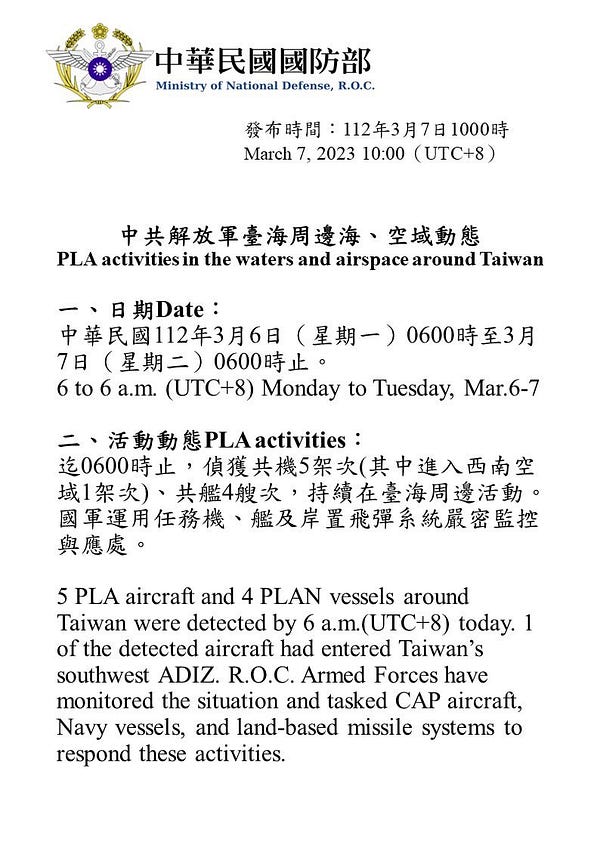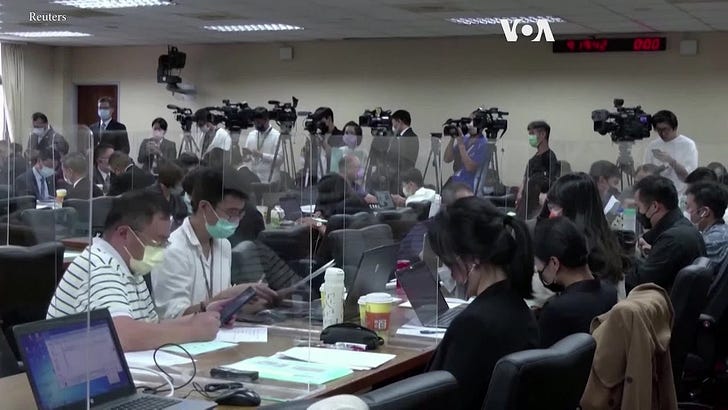Potential Chinese incursion in Taiwan; Canada probes into alleged election interference by Beijing
A TMP roundup
Dear China watchers,
I’m really grateful for your patience as I took my time to recover from this long COVID. (Truth be told, I’m still dealing with a lingering cough and my voice sounds like a ghost but I’m much better now)
That being said, while I was watching on the sideline, sipping my tea, I witnessed the busiest Canada-China news cycle since I moved to the country nearly a decade ago. Canadians have seen headline after headline about the alleged election interference by the People's Republic of China. As you probably already know, these allegations are quite serious and are penned by seasoned reporters working at reputable news organizations. While our readers in other middle powers might be familiar with China’s interference, most Canadians only started to suspect Beijing’s meddling in their home affairs recently.
And as hard as Canadian Prime Minister Justin Trudeau or the Liberal Party has tried to shut down the media reports, including denying ever being briefed on the matter, playing the Trump card and calling the allegations racist, the steady drip of leaks from the Canadian spy agency has triggered sweeping distrust among Canadians. A recent poll suggests that a majority of Canadians believe Beijing has attempted to interfere in recent federal elections and wants to see stronger measures to prevent this from happening.
Under immense public pressure, Trudeau made a last-minute announcement on Monday promising to appoint a “special rapporteur” in the coming weeks. This might have worked outside of Canada, but on its home turf, Canadian journalists and commentators are not satisfied with the actions taken since Trudeau is still resisting pressure to call a public inquiry.
As I watch these stories unravel in Canada, it reminds me of the conversation we had with ASPI analyst Blake Johnson back in October. One of the best ways to protect democracies from foreign interference is always by strengthening local media.
If you like what you read, please hit the share button and spread the word. Or better yet, become a future paid subscriber and pledge your support today.
Switzerland
China's battery industry is turning to Switzerland as a stable and liquid market as the U.S.-China rivalry intensifies. In a Chinese analysis from The News Lens, reporter Zhuang Maojie noted that over 10 Chinese lithium battery companies are eying Switzerland for an IPO.
But why? Zhuang noted that amid tension between Beijing and the west, it is increasingly difficult for Chinese businesses to list in other markets. And many in the business community view Switzerland as a “permanently neutral economy” that is well-suited for investment under the current political climate.
What’s more interesting to me, though, is this detail from the article:
“A few days ago, Cao He, president of Quanlian Automobile Investment Management, said in an interview with a reporter from The Economic Observer that Chinese companies listed in Switzerland have policy support and …” What kind of policy? I couldn’t find any online but did He(that is his last name) indicate some sort of government support? That is the question in my head.
Germany
The German government is planning to ban telecom operators from using certain components from Chinese manufacturers Huawei and ZTE in their 5G networks, according to yet another anonymous government source who spoke to the German media.
This ban could have a significant impact, considering that Germany represents a quarter of all mobile customers in Europe and the German telecommunication network relies heavily on Chinese vendors. In 2022, 59 percent of the 5G RAN (Radio Access Network) in Germany comes from China. Huawei has a larger market share in Berlin than in its home market of Beijing, where it’s forced to compete with other tech giants like ZTE. Plus, Germany’s largest operator Deutsche Telekom has a strategic partnership with Huawei.
All middle powers in the Five Eye intelligence alliance: Canada, Australia and New Zealand, have banned Huawei and ZTE products from their 5G network.
Canada
Canada’s largest life insurance company, Manulife Financial, plans at least two more senior hires in China. With full control of a Beijing-based mutual fund, Manulife is venturing into China’s booming private pension industry.
This is a much-expected move for the Canadian insurer. Last November, shortly after the Chinese government announced its plan for a nationwide private pension scheme, Manulife received Beijing’s approval to buy out its Chinese joint venture, becoming the fourth foreign firm in China to operate a wholly owned mutual fund. The company said then it would focus on pension products in China.
Despite the recent surge in global investment in China’s asset management industry, Canadian investment in China’s finance sector has dropped since 2018—yes, that is the same year that Huawei’s deputy chair Meng Wanzhou was detained in Vancouver.
According to Reuters, the company is hiring two new roles: a deputy general manager for fixed income and a chief operating officer by the end of march.
Taiwan
A lot has happened recently in the political scene between Taiwan and China, and tensions are running high in the Taiwan Strait.
One of the most alarming developments is:
On Monday, Taiwan’s defence minister Chiu Kuo-cheng warned of a “sudden entry” this year by the Chinese military into areas close to its territory. Chiu was answering questions from lawmakers in parliament when he said the following:
“I think they(China) have been waiting for an excuse to justify an incursion. For example, if high-ranking officials come for a visit…or if our military conducts frequent interactions with the outside…they might make a sudden entry, and that could be serious,” he continued, “so we need to avoid giving them an excuse.”
On the same day, the Financial Times published a story revealing that Taiwanese president Tsai Ing-wen convinced US House Speaker Kevin McCarthy to meet in California rather than Taipei to avoid an aggressive Chinese military response.
Will Taiwan’s goodwill of not antagonizing Beijing work? Probably not. If you are also thinking about former Taiwanese President Lee Teng-hui’s visit in 1995, I am with you. Remember, after Lee gave a speech at Cornell University in the U.S., Beijing conducted a series of missile tests in the waters near the island.



How we got here: Last week, the island reported a second day of large-scale Chinese air force incursions nearby before the U.S. approved the potential sale of $619 million in new weapons to Taiwan, including missiles for its F-16 fleet.
By-election: Last Saturday, the ruling Democratic Progressive Party beat the Kuomintang Party in the by-election in Nantou County by a narrow margin.
Thank you for reading if this was shared with you, please consider subscribing.



